Croatian Ski Resort Platak Finally Welcoming Visitors for Ski Season 2023
January 21, 2023 - Platak is one of Croatia's famous ski resorts, located near Rijeka, not too far from Zagreb either. It is perfect for a little winter family getaway or just a weekend in the snow. After a slightly longer wait, the 2023 ski season seems to finally be here. Platak is being prepared and will be welcoming visitors from Tuesday, 24 January.
As Index reports, after the much-needed cold weather arrived, the snowmaking system was started on Platak. If everything goes according to plan, the ski resort will be open on Tuesday, January 24, according to the regional sports centre.
There is 25 to 30 cm of natural snow on Platak
The director of the Regional (Goranski) sports centre, Alen Udovič, told Hina that the snowmaking system was started last night to prepare a high-quality snow surface in time and enable as many skiing days as possible, and it will work until Monday.
There is now 25 to 30 centimeters of natural snow on Platak, which, he added, had first fallen on the wet and warm ground, but now, after cooling down, it is slowly compacting. Udovič said that, according to the weather forecast, Platak can expect several cold and windy days and that additional amounts of natural snow are possible.
He announced that even during this weekend, skiers and ski schools would be able to use a baby trail on Platak, while sledders would use the baby lift to take them to the lower part of the Pribeniš trail.
Next week, depending on the weather, night skiing on Tuesdays and Fridays will be possible in addition to day skiing every day. Udovič also announced that from January 27 to 29, the 2nd edition of the international race European Skibike Cup would be held on Platak for the second time, expecting 40 competitors from 11 countries.
For more, make sure to check out our dedicated Lifestyle section.
Snowboarding Championship Moved from Delnice to Platak Over a Communication Breakdown
February 21st, 2022 - The Gorski Kotar town lost the bid to host the snowboarding event as all attempts of communication with the organisers fell through on both sides
Delnice, the biggest town in the mountainous Gorski Kotar region, was being considered for the host of an international snowboarding championship scheduled for March 5th, 2022.
The event was supposed to finally put the Delnice ski jumping ramps to good use, a facility that cost the County some 800,000 kuna when it was first built, only for it to never host any athletes or sporting events. Over time, the ramps became a sad symbol of pointless local investments, reports Novi list/Marinko Krmpotić.
A chance for Delnice to turn things around came when the town was presented with an opportunity to host a snowboarding championship in March 2022. The initiative came from Leo Pavela, a councillor of Primorje-Gorski Kotar County, who reached out to president of Rijeka’s Snowboard Club Nine Miodrag Toskić to discuss potential plans for the organisation of the event.
‘Our goal was to use this international competition to present Delnice and Gorski Kotar in the media as Croatian ski destinations. At the event itself, we wanted to highlight the history of Delnice through the story of ski jumping, presentation of a former ski manufacturer and the promotion of Delnice as a centre for basic training of athletes. The entertainment programme was supposed to feature the best DJs of Gorski Kotar, and there were also negotiations to organise a sale of products made in Gorski Kotar’, said Pavela.
In October 2021, Toskić and Pavela met with Delnice Mayor Katarina Mihelčić and Director of the Gorski Kotar Tourist Board Petar Hrg. The parties agreed that the funds were to be raised in a joint effort, with Pavela tasked with securing 50,000 kuna from the county budget; the City of Delnice offered to allocate 30,000 kuna, and the tourist board was to provide 20,000 kuna.
This is where things got complicated, with a failure in communication that resulted in Delnice losing the bid to host the snowboarding event.
While the Gorski Kotar Tourist Board and the County both held their end of the bargain, Pavela and Toskić claim that Mayor Mihelčić failed to respond to their request for funding, first sent by Toskić on December 1st, 2021. An official reply was reportedly sent from the City of Delnice, but was returned to sender over an incorrect address several times in the span of two months.
‘It’s unbelievable that regardless of the fact that mail was returned to the local authorities several times, no one at the City of Delnice found it necessary to check the address or notify the organiser by email, or at least give him a phone call to resolve the issue. Such negligence shown by the City towards the event that was supposed to be very important for the promotion of winter sports in Delnice and Gorski Kotar resulted in the transfer of Delnice Snowboard Session to Platak, which saddened many people of Gorski Kotar’, said Pavela.
As the organisers didn’t receive a guarantee they’d get the promised funding in time, a decision was made for the snowboarding event to be held in Platak instead of Delnice. Platak is a ski resort located to the northeast of Rijeka.
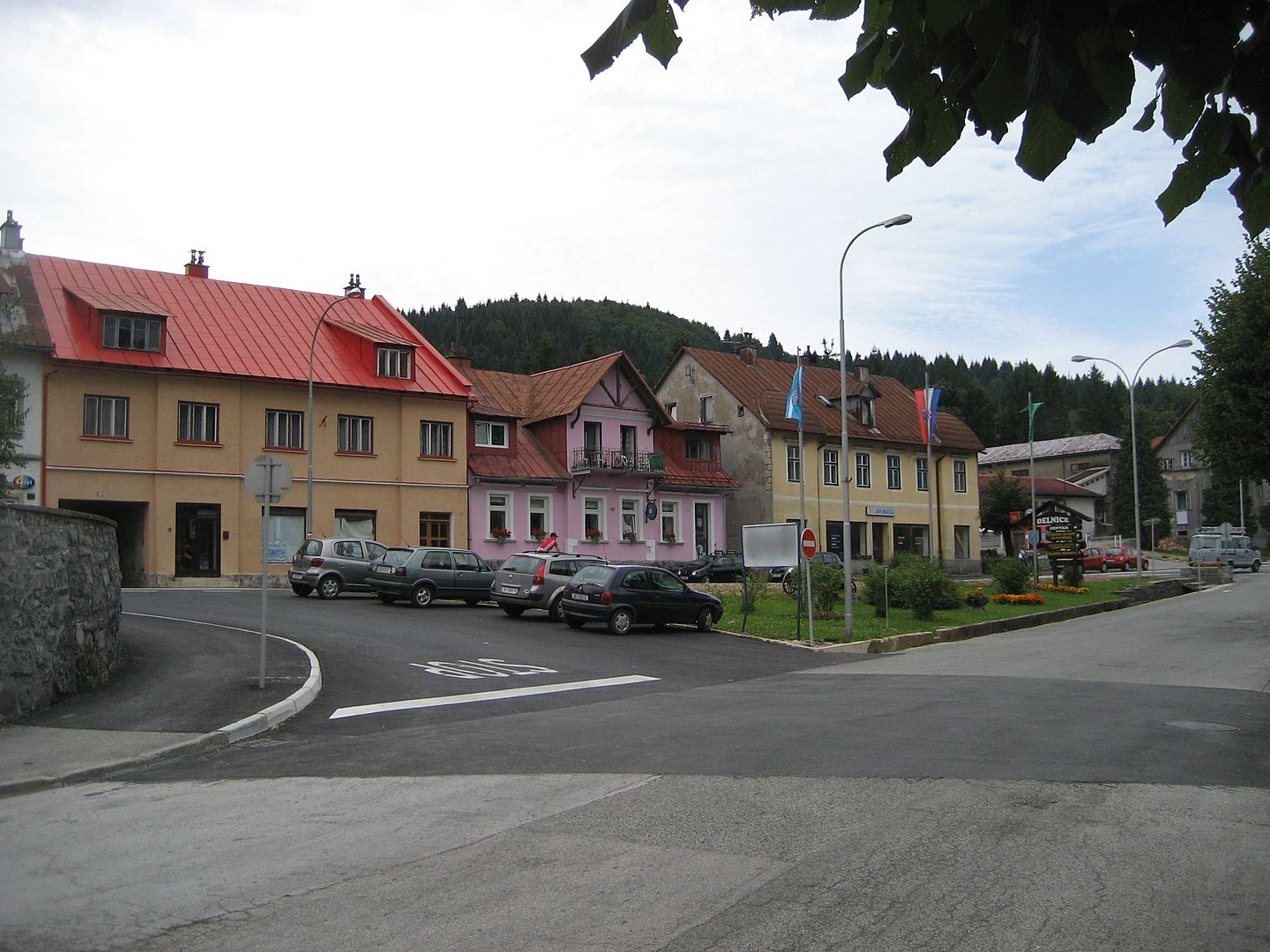 Delnice
Delnice
Delnice Mayor Katarina Mihelčić tells a different story. Approached by Novi list for a comment on the accusations, she called Pavela’s statements an arbitrary interpretation of facts.
‘All we asked of the organisers was to apply to the tender of the City of Delnice before February 18th, 2022 so that we could justify the allocation of funds from the City’s budget in the amount of 30,000 kuna. Moreover, we tried to inform the organisers of this both by email and regular mail’, said Mayor Mihelčić.
She provided a detailed timeline of the bizarre chain of events: on December 9th, the City of Delnice informed the organisers that the funds were not set aside in the city budget and that they need to apply to a public tender. In the same month, on the 10th and 31st respectively, the City sent two notices in the mail, but both letters were returned marked ‘Unknown recipient’.
Toskić called the Mayor’s offices on January 11th, 2022 to let them know he didn’t receive their reply, and gave them the email of the snowboarding club so that they could forward him a scanned copy. Three days later, on January 14th, he called again saying he didn't get the email and again gave them the same email address, along with his private email.
A month later, he emailed the mayor saying that the snowboarding club would be forced to move the championship to Platak if the City of Delnice doesn’t sponsor the event with 30,000 kuna.
On February 15th, a reply was sent to Toskić stating that the City of Delnice can allocate funds in the maximum possible amount of 5,000 kuna at this point, in accordance with the valid legislation regarding sponsorship. He was again encouraged to apply to the public tender, and the rest of the necessary funds would have been allocated from a different section of the budget, namely the funds intended for the development of tourism.
In return, Toskić sent a reply on February 16th stating that he doesn’t have time to apply to tenders, that he couldn’t launch the final phase of the organisation without signed sponsorship agreements, and that the entire championship would be organised at Platak instead.
‘We wanted to give them the funds, but only in accordance with legal provisions that clearly define the manner and purpose of the allocation. The Club was not able to meet those demands, and now they assign us the blame. I wonder why, and if it was all done on purpose to create another media affair’, said Mihelčić. The last part of her statement likely refers to a recent dispute between several parties interested in the lease of a business space in Delnice, with the public tender reportedly carried out in a somewhat questionable manner.
The Town of Delnice provided documentation to Novi list, including the email correspondence which clearly shows they demanded that the organisers apply to the public tender so that the funds could be allocated for the event.
When Music Meets Nature: Revizor, Soundtrack for Adventures in the Wild [VIDEO]
February 18th, 2022 - Croatian musician and producer Vedran Križan, a self-described nature lover and outdoor enthusiast, created a unique project that combines two of his greatest loves - music and nature
Meet the Revizor project, a series of ambient electronic compositions written and performed by keyboardist Vedran Križan, who describes it as a soundtrack for recreation or meditation. Revizor is influenced by various genres and subgenres of electronic music from the 60s to the present day, with each single performed outdoors as a live act to draw attention to the importance of spending time in nature.
Not only outdoors, but in quite special locations at that. The first live act named The View was performed and filmed on Vojak peak at the top of Učka mountain, a scenic location with a spectacular view of the Kvarner gulf on one side and Istria on the other.
Watch the video for the first single below:
Križan said the project probably wouldn’t have taken shape if it weren’t for the pandemic-induced lockdown.
‘A positive thing about the lockdown was the enormous amount of free time which I used to play music, create, and go into nature… As the compositions were taking shape, I was thinking about how to present them visually, as no one will listen to anything for more than a minute these days if they don’t have something to look at. Because of the pandemic, the Ministry of Culture supported artists in their efforts to present their work digitally, and I decided to take things a step further and use the opportunity to promote a healthy and active lifestyle. Instead of typical music videos, I wanted to present my music as a live act, step out of my comfort zone, and reveal the wonders of nature and all its benefits to the audience’, said Križan for Novi list when he first came out with Revizor.
'It’s music for different mental states and travels, whose effect I tested on myself. For example, I’d play a part of the piece while walking in the woods or while rowing', said the musician.
He has now presented the second Revizor single with a video filmed in Platak, a ski resort north of Rijeka.
As reported by Novi list, the single named Live at Platak was performed and filmed on January 21st, 2022 in true winter conditions at the Radeševo peak, one of the few ski resorts in Europe that have a view of the sea.
Križan plays the keyboard and is joined by renowned musician and composer Zvjezdan Ružić on mellotron. Watch them perform the ambiental piece against the crisp white backdrop:
Križan is best known as the keyboard player in Neno Belan’s band Fiumens, but he’s also worked with numerous Croatian musicians and performers over his career of 30 years (Denis & Denis, Laufer, Urban&4, Let 3, Pips chips & videoclips, Kensington Lima, etc).
Platak Ski Resort Gets New Toboggan Run, New Cable Car Planned
January the 25th, 2021 - Rijeka's Platak ski resort is set to get not only a brand new toboggan run, but a new cable car on which construction will hopefully begin during the warmer summer months.
As Vecernji list/Radmilla Kovacevic writes, as was expected, given that skiing abroad is written off given the ongoing coronavirus pandemic, Croatian ski resorts will simply have to do. They don't boast kilometre-long trails, they aren't equipped to the highest ski standards as is the case in numerous famous European ski resorts, but during these coronavirus-dominated times, needs must.
At the famous Platak ski resort, where since last year they have had a system in place worth fourteen million kuna with fourteen snow cannons, a new accumulation lake with 50,000 cubic metres of water, an engine room and cooling towers, they had to limit ticket sales in the first days, the same is true for other Croatian ski resorts.
Several factors coincided, apart from the fact that foreign ski resorts are currently inaccessible, snow fell during the school holidays, which is the factor that drives Croatian skiers the most even when there is no pandemic to speak of.
''In Croatia, skiing started on January the 2nd, when the conveyor belts were opened, and on January the 5th, the cable car started working. At that time we were the first ski resort to open in this part of Europe. By the way, skiers typically gravitate towards us in a circle of 200 kilometres, but now they're coming from everywhere, from Nasice, Osijek and Varazdin all the way to Dubrovnik. During the first few days we had a lot of pressure to deal with, on the first day we sold 1100 tickets, which means that there were about 3500 people on Platak. After that, we limited the daily ticket sales to 600 and people were skiing until the rain came on Wednesday, but soon we should have snow again,'' said Alen Udovic, director of the Gorani sports centre in Platak, which this winter got a brand new toboggan run of 250 metres next to the mobile trail, and construction of a new cable car should begin by summer.
According to those at the Platak ski resort, the toboggan run through the forest is a complete success, and many are looking for winter joy on Zagreb's nearby Sljeme as well. The demand for tickets is also very high, some have returned in recent days disappointed that they haven't managed to fall into the daily quota of a thousand ski passes.
The Sljeme ski resort, which opened on January the 19th, is open every day from 09:00 to 16:00, and for the first day or two, 700 ski passes could be issued by 10:00.
"I also met the team I was with in France with last year," said a Zagreb resident on Facebook, confirming that many have given up going abroad this winter, but they haven't given up on skiing.
For the latest travel info, bookmark our main travel info article, which is updated daily.
Read the Croatian Travel Update in your language - now available in 24 languages.
Platak Ski Resort With Sea View Opened for Skiers and Sledders
January 6, 2021 – The ski season is finally open. Platak ski resort, a popular excursion and winter site on the Snježnik mountain slopes, has opened its ski and sledding tracks.
This popular ski resort located in Primorje-Gorski Kotar County is only 30 minutes away from Rijeka and about two hours from Zagreb. Also, it is only about ten kilometers away from the sea, so in the winter months, you have the opportunity to ski and sled on Platak on the same day, and then go down to the sea for lunch and a walk.
Platak is the only Croatian ski resort with a sea view, which allows visitors to enjoy two Croatian beauties at the same time – the mountains and the sea.
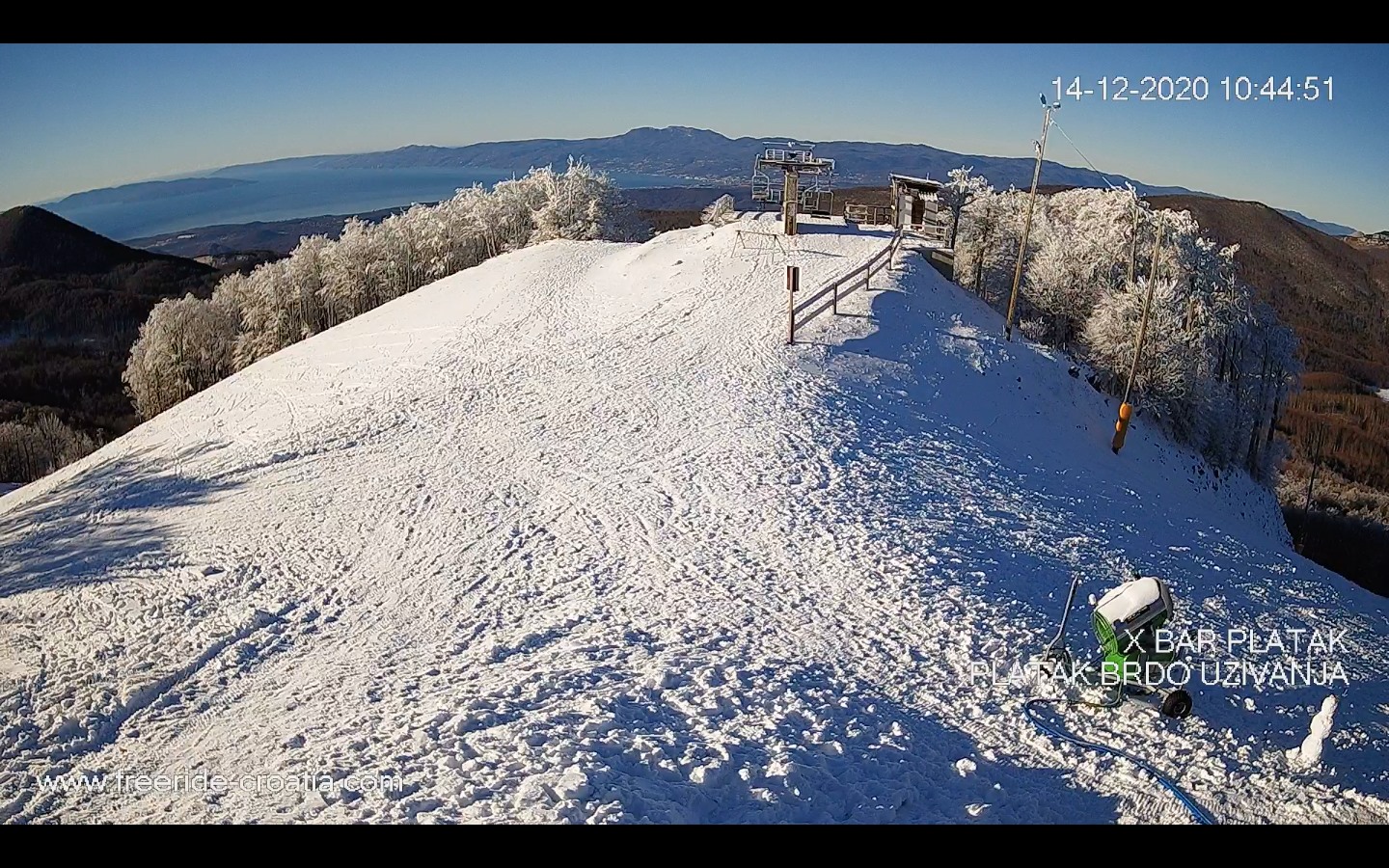
Platak on December 14, 2020. The sea can be seen in the background. / Source: Platak Facebook
As National Croatian Tourist Board reports, thanks to the new snowmaking system that the Platak Regional Sports and Recreation Center received last season, the Platak ski resort opened its doors on Saturday, January 2, 2021. Skiers can ski from 9 am to 4 pm on ski slopes Radeševo 1, Turistička staza (tourist track), and on a previously open track along the conveyor belt at the foot of Radeševo. Sledders can sled on one of several sledding tracks.
The ski season is finally open, and skiing and sledding enthusiasts have already occupied Platak. According to reports from the Primorje-Gorski Kotar County, a total of 522 tickets were sold yesterday by noon, and a large number of visitors came to enjoy sledding and walking. Also, about 40 centimeters of snow fell last night, so visitors enjoy a real snow idyll.
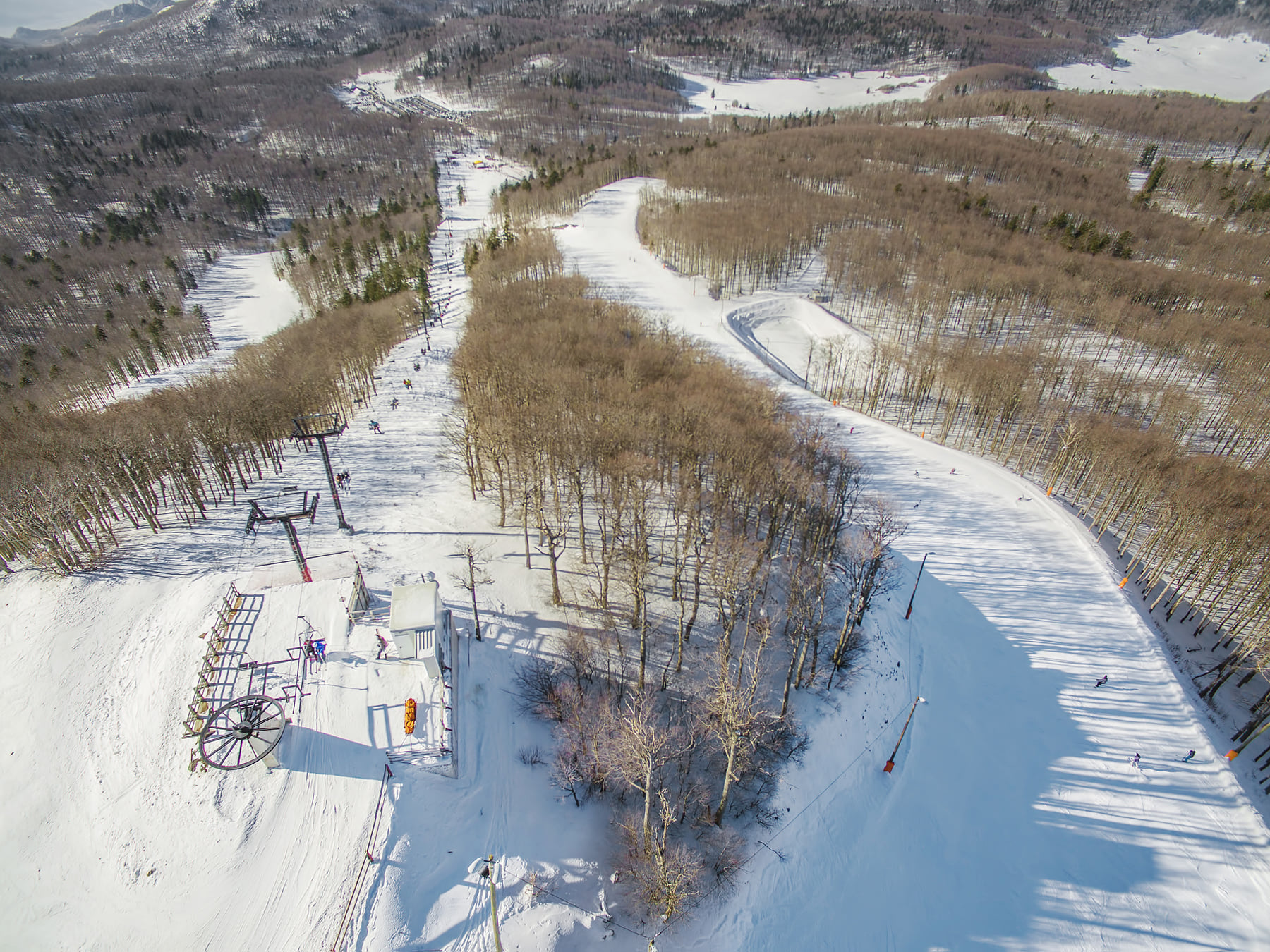
Platak ski resort / Source: Platak Facebook
You can also ride ski bikes (snow bikes) and snowmobiles on Platak's trails and forests. In order to ensure skiing for up to 50-60 days a year, a new snowmaking system worth HRK 23 million has been introduced. It includes 14 snow cannons, a new accumulation lake with 50,000 cubic meters of water, an engine room, and cooling towers.
In its unique wooded environment, the Platak Regional Sports and Recreation Center offers a handful of other facilities that can be enjoyed throughout the year. Among those are hiking trails, promenades, bike routes, unexplored paths, barbecues for rent, sports fields such as disc golf courses, bowling alleys, football fields, basketball, beach volleyball, and badminton.
There are also nine bike trails, a bike park with two trails (downhill and flowhill), and the possibility of a panoramic cable car ride.
For the latest travel info, bookmark our main travel info article, which is updated daily.
Read the Croatian Travel Update in your language - now available in 24 languages.
HRK 9.6m to Be Invested in Platak Ski Resort Next Year
ZAGREB, Dec 20, 2020 - Primorje-Gorski Kotar County will invest HRK 9.6 million (€1.28m) in the further development of the Platak ski resort next year, the County Assembly decided earlier this week.
The money will be used for the completion of snowmaking pipelines and three ski runs. The completion of the snowmaking system, installation of a new ski lift and further development of ski runs, roads and other amenities are planned for the coming years.
Under the investment plan, the County will invest about HRK 41 million (€5.4m) in the Platak sports and recreation centre by the end of 2023.
Platak is located just northeast of the northern Adriatic city of Rijeka.
Meet HGSS The Croatian Mountain Rescue Service
August 19, 2020 – All weather, all terrain, all year round – meet HGSS The Croatian Mountain Rescue Service, amazing volunteers who will never let you down
They're never far from the news. For the last two weeks, members of HGSS The Croatian Mountain Rescue Service have yet again been on the TV news every night. They're leading the search for a summertime visitor, a Polish hiker missing on Biokovo mountain.
But, watch again this winter and, for sure, they'll be in the headlines once more. Whether, they're scaling mountain ranges in the unbearable heat of high summer, searching underwater caves, flooded rivers or the sea, breaking through wild forest or trudging through metres of snow, they undertake their search and rescue missions over every terrain, in every weather condition, in every month of the year, all across Croatia. And, they all volunteers.
Marc Rowlands meets the head of service for HGSS The Croatian Mountain Rescue Service and three of its volunteers to find out who they are and what makes them do what they do.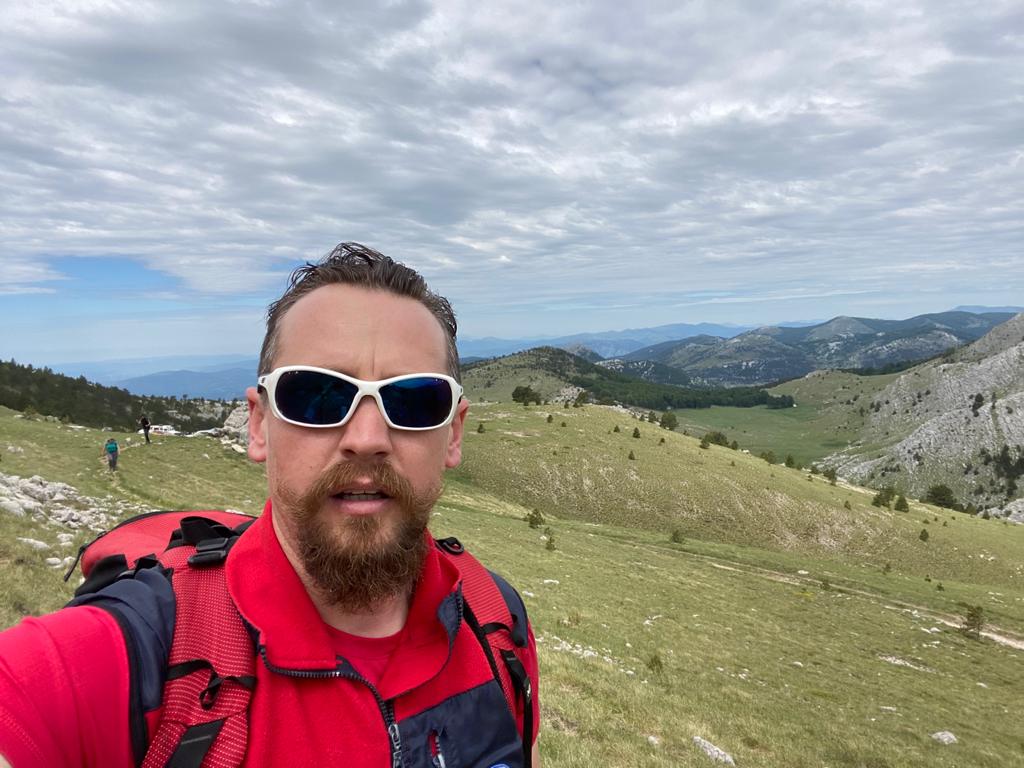
Josip Granić, head of service for HGSS The Croatian Mountain Rescue Service
My name is Josip Granić. I'm the Head Of Service for HGSS The Croatian Mountain Rescue Service. We've had an extremely busy couple of weeks. Being head of service for an organisation like this under such circumstances means you're always on the phone; co-ordinating, talking to outside organisations, members of the press. Communication. It's a 24/7 job, 365 days a year. If people need help, you can't take a holiday. Not at this level of the organisation.
We have around 1000 members. There are 11 paid positions in the main organisation and 25 people we pay to run the administration in each of the teams or stations we have. All of the members who perform the search and rescue are volunteers. We have pilots, surgeons, nurses, students, professors, every part of society.
I'm originally from Kaštela, but my home station is in Karlovac. I've been there for 15 years. I've been Head Of Service for two. Since I assumed the position, I've spent most of my time in the car. I travel all over Croatia.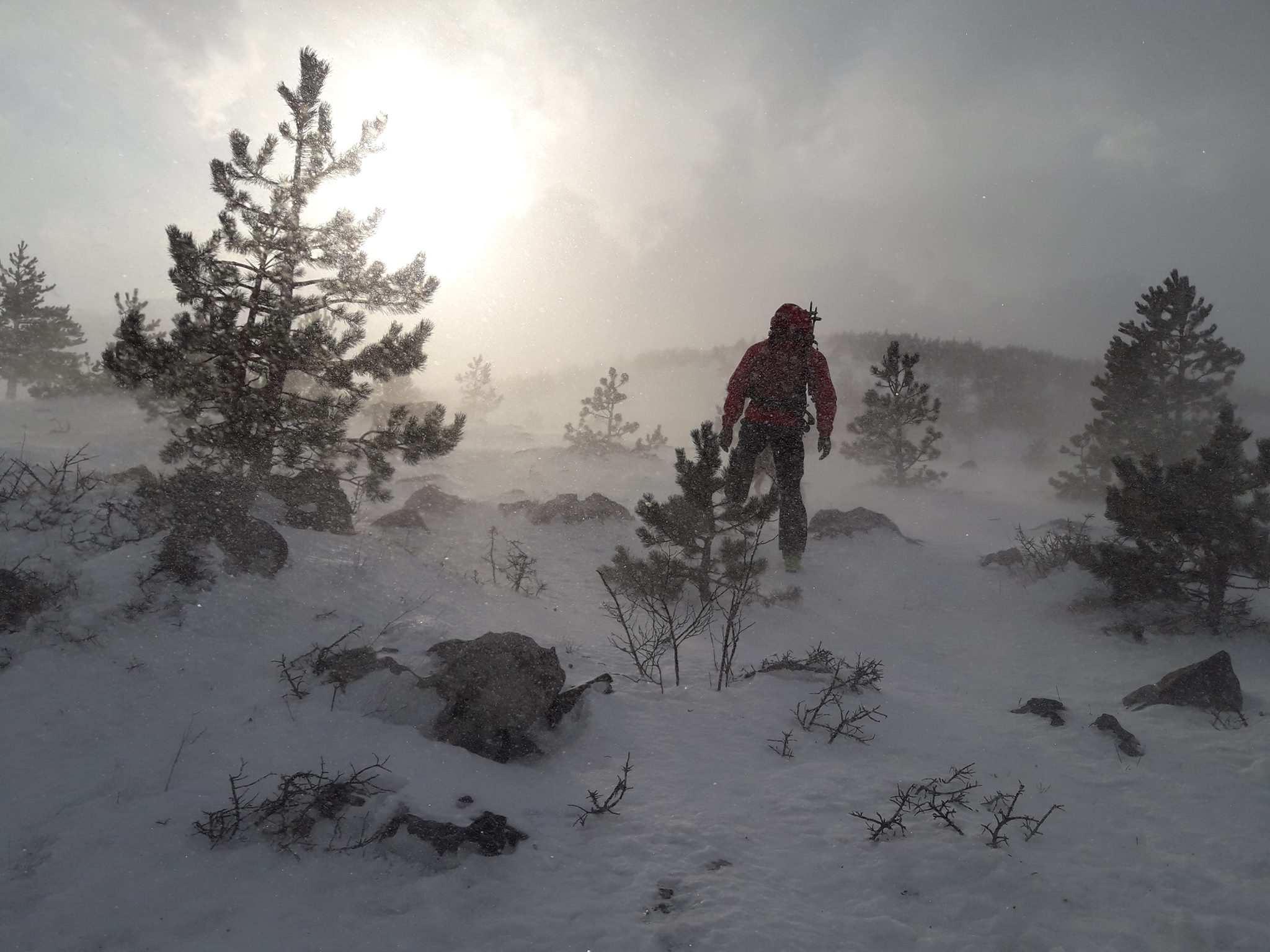
HGSS The Croatian Mountain Rescue Service missions can be hampered by extreme weather conditions © HGSS The Croatian Mountain Rescue Service
To get a certified position as a mountain rescuer in Croatia you all do the same training. It doesn't matter if you come from Slavonia, Dalmatia or Istria, you must have the knowledge and ability to deal with circumstances in any terrain; caves, pits, mountains, on snow, underwater.
Depending on where your station is, the type of call-outs you get could be very different. In Slavonia, 90% are for missing persons - searching forests, rivers, and in floods. We've had a big search on Biokovo mountain for the past 16 days. The stations from Split, Makarska, and Dubrovnik were at first involved, then teams from all over Croatia. It's not the same as Slavonia. The terrain is very different, so you have to be good at a particular set of skills. But, the largest percentage of call-outs is still missing persons. It's 70% of our work nationwide. The other 30% are rescues.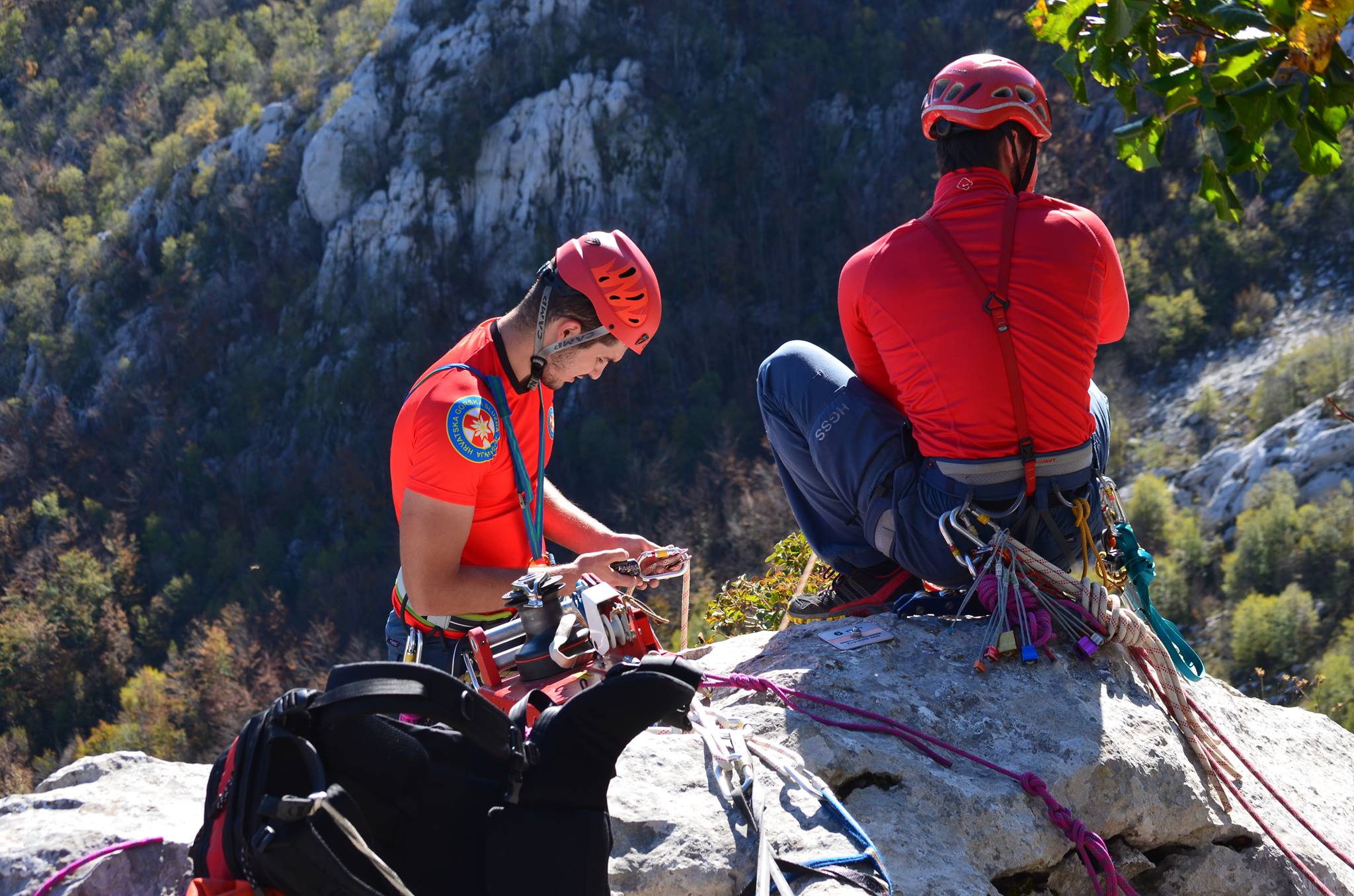
HGSS volunteers are educated to use a wide range of technical equipment. They are trained to operate in all the different kinds of terrain found across Croatia © HGSS The Croatian Mountain Rescue Service
There are usually 800 – 1000 missions a year across the country. We get roughly the same amount of calls in colder months as in warmer months. Only, winter months can be busier. The terrain is more difficult. There are some villages in Croatia – usually where the front line of the fighting was, around Karlovac, Kordun, Lika – and when it snows, it can be almost impossible to reach those places. But, some older people still live there. It can take days to reach them on snowmobiles, then skis, to deliver food or medecine. The other busiest places in winter are the ski resorts - Platak, behind Rijeka, and in Zagreb, on Sljeme. There are teams stationed in those places throughout the snow season.
What's the greatest danger of the job? Almost everything. Nothing in this job is easy. The greatest dangers we face are the same facing those that we rescue - underestimating the environment, nature, the conditions. That's where our training comes in.
In mountain rescue, we separate dangers into subjective, objective and technical. Subjective is the stuff you're guilty of - lack of preparedness, knowledge or equipment. Objective dangers are the ones you can't control, like sudden changes in weather, or avalanche. If you're sensible and informed, there should be no objective danger.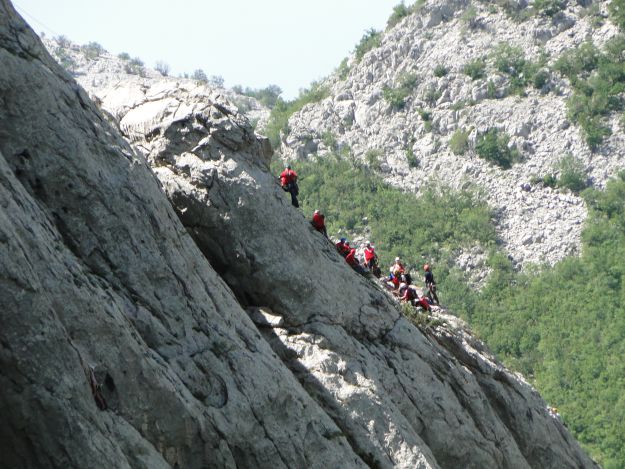
HGSS on a mission, clinging to a steep incline in Paklenica © HGSS The Croatian Mountain Rescue Service "People need to be aware at all times on the mountains. By the time most people think they may be in trouble, they've usually been in trouble for five or ten minutes already" Josip Granić.
80 – 85% of the people we rescue are Croatian. Only 15 – 20% are guests. People from Czech Republic, Slovakia, Poland, (Austria and Slovenia too) tend to enjoy nature more. They like hiking. That's the reason there are typically more rescues for those nationalities than there are for British, Belgian, French, Italian, America, Canadian or Australian guests. I don't remember the specific year, but sometime between 15 and 20 years ago we had a season where 5 or 6 Czech nationals were being searched for or, sadly, turned up dead. The media covered it and ever since there's been this myth that all the people who get into difficulty are Czech.
The question about expensive helicopter rides - why don't you charge the people you rescue - has been here forever. It's like this - if you're a tourist and you have a car accident in Croatia, the fire service, police and an ambulance will come. You won't get charged. We are a tourist country. According to international agreements, we are obliged to make everything safe for residents and guests alike. We are here, just like the fire service and police, to do our part. The Croatian air force is responsible for the helicopter rides and I have to give credit to them - they are crazy good pilots. Amazing. Even if we did charge everyone we saved - and most of the 85% of Croatians we save would struggle to pay - it still wouldn't be anywhere near the money required to run this service.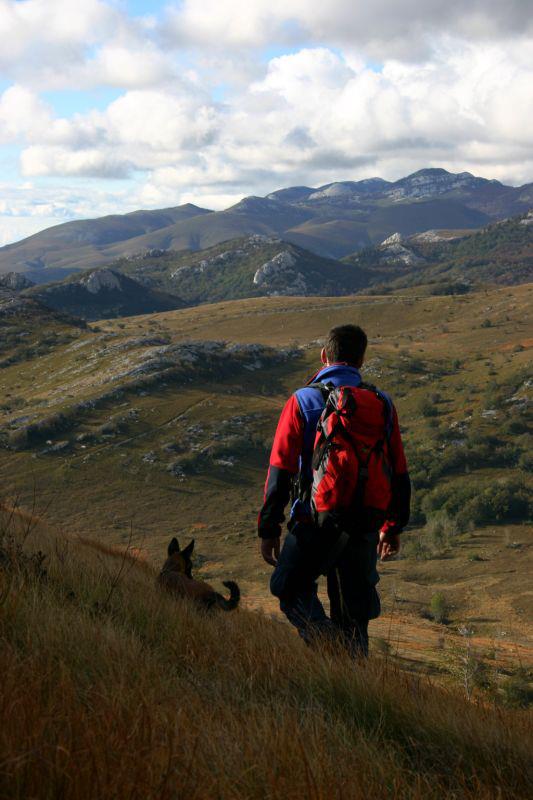
The Croatian Mountain Rescue Service used specially trained dogs on their searches © HGSS The Croatian Mountain Rescue Service
In 2007, I got a new search dog. It came from the Ogwen Valley Mountain Rescue service in North Wales. We cooperate a lot. We were sent out on a job to look for a three-year-old male child who had gone missing near Požega at the beginning of January, wintertime. His grandma was watching him and they were in a house on the edge of the woods. Early in the morning, he was playing with a dog. It suddenly ran into the forest and the boy chased after him. The grandmother didn't see it happen. I found him using my new dog, just after 8 o'clock the next morning. He'd been alone in the freezing forest for almost 20 hours.
Time is really moving fast on a job like that, because it's a kid and because it's so cold. Survival rates in such conditions are not good after 24 hours. When I found him, saw that he was alive, those big eyes looking up at me, it's a crazy feeling. You can't describe it. You can't compare it. A lot of positive emotions.
Every mission is special. We meet them all with the same level of determination and professionalism. But, it's the ones where you know you've really saved someone that stand out in the memory. Not the broken leg, where you transported someone – sure, that's an excellent job. But, when you know you've saved someone's life, that they definitely wouldn't be here now if it weren't for you, that's what makes it all worthwhile.
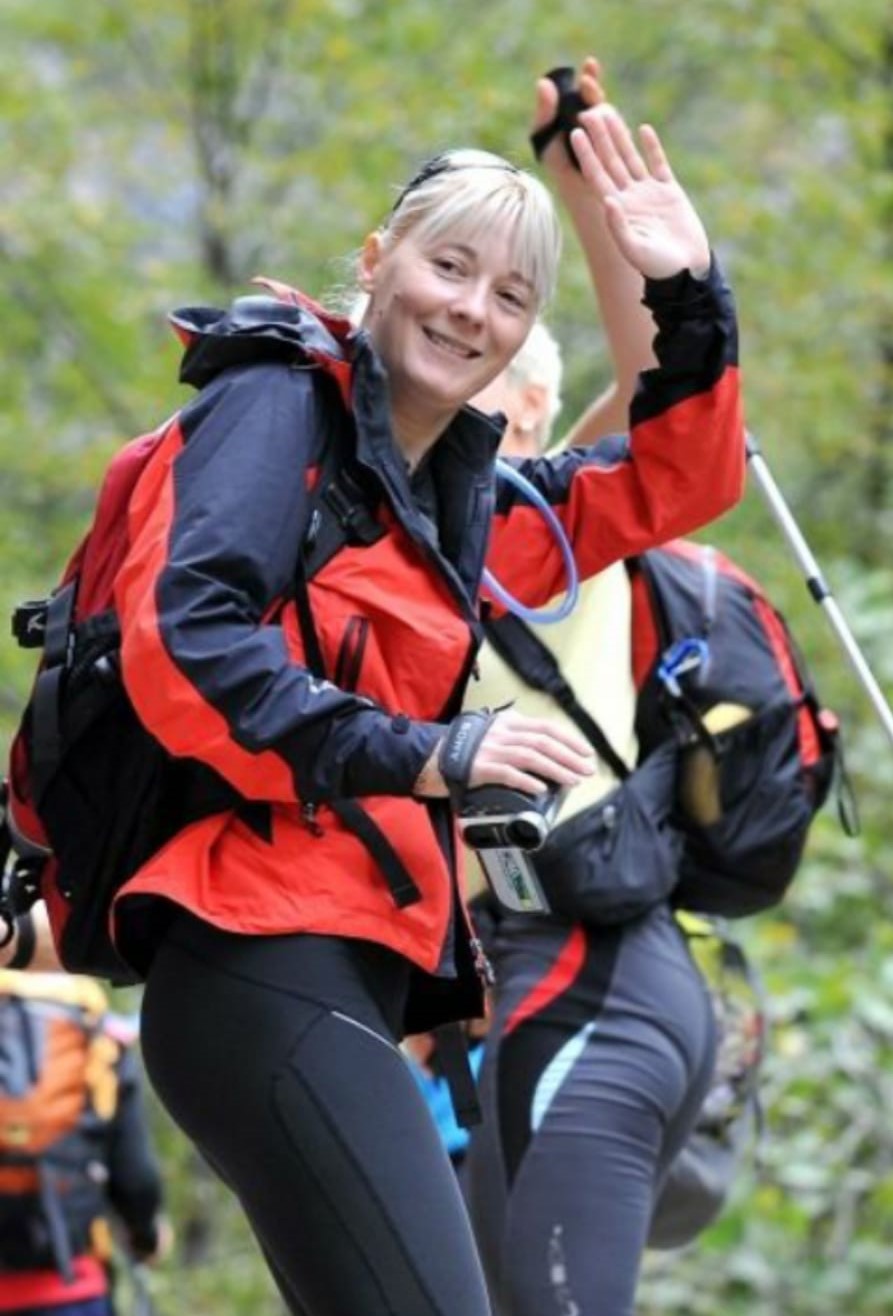
Jana Mijailović, volunteer for HGSS The Croatian Mountain Rescue Service
My name is Jana Mijailović, I'm 48 years old and I'm from Zadar. I finished school to be a teacher, but I never did it. My husband and I run a company that does plastic and aluminium windows for houses.
I started to go into the mountains when I was at high school. I never had the ambition to be part of mountain rescue services – people just noticed me on the mountains. They said I'd be good at it and asked me to join. I met my husband on the mountains. We are both volunteers for HGSS The Croatian Mountain Rescue Service. I've been doing it for 16 years.
I was a member of the first and second all-female Croatian expeditions to the Himalayas. We first climbed Cho Oyu in 2007, then Mount Everest in 2009. Croatia is the only country in the world that has only one successful male climber of Mount Everest, but four successful female climbers. I sometimes work as a guide too. I guess you could say I'm all about the mountains.
Being a climber, an Alpinist, I know that if I get into trouble, it's only my HGSS colleagues who can help. I feel this instinctively. I cannot be in the house, safe and warm, knowing that maybe someone needs help that only I can provide.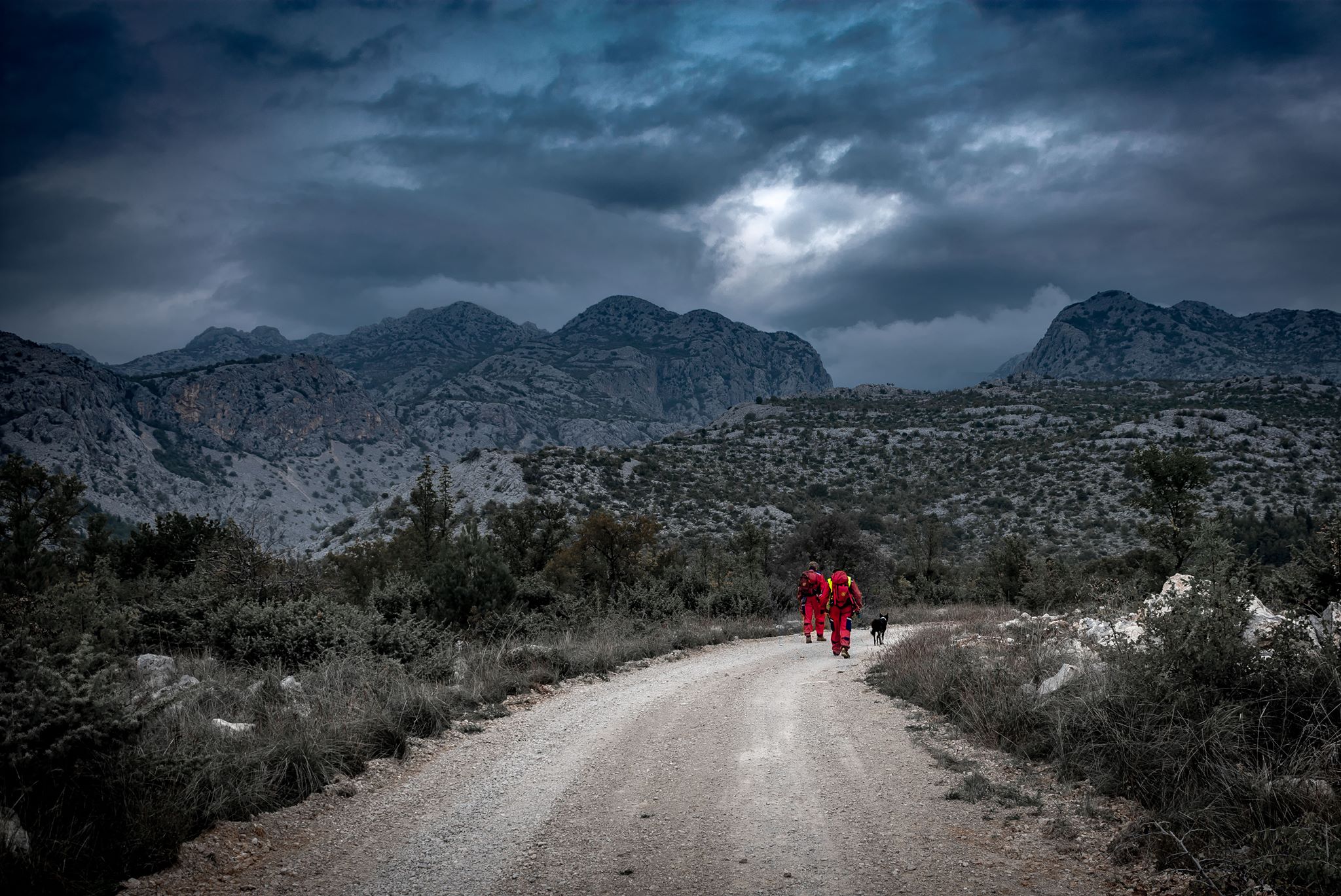
HGSS The Croatian Mountain Rescue Service members entering Paklenica under foreboding skies © HGSS The Croatian Mountain Rescue Service
I've really been on so many expeditions with HGSS. My station are on duty in the season at National Park Paklenica and I'm now the coordinator. Climbers from all around the world come and so there are many interventions. None of them are easy because the terrain is incredibly difficult. You really have to be in shape and know the techniques inside out.
I'm very proud of my statistics. Everyone I've rescued, who was alive when I reached them, is still living today. Unfortunately, not everyone we reach is alive when we arrive.
I remember one time, my husband and I were having dinner. We were arguing about the techniques and knots for moving a stretcher down a vertical climb. The training is so intense, you really have to know it well, and I guess that's just the kind of people that we are, that we would be arguing about it in our free time. Ha! He told me, "Why do you care? You'll never have to do that," because usually, it's really strong guys who do that specific job. If you're on a 400-metre-high section of rock, it really takes a lot of muscle.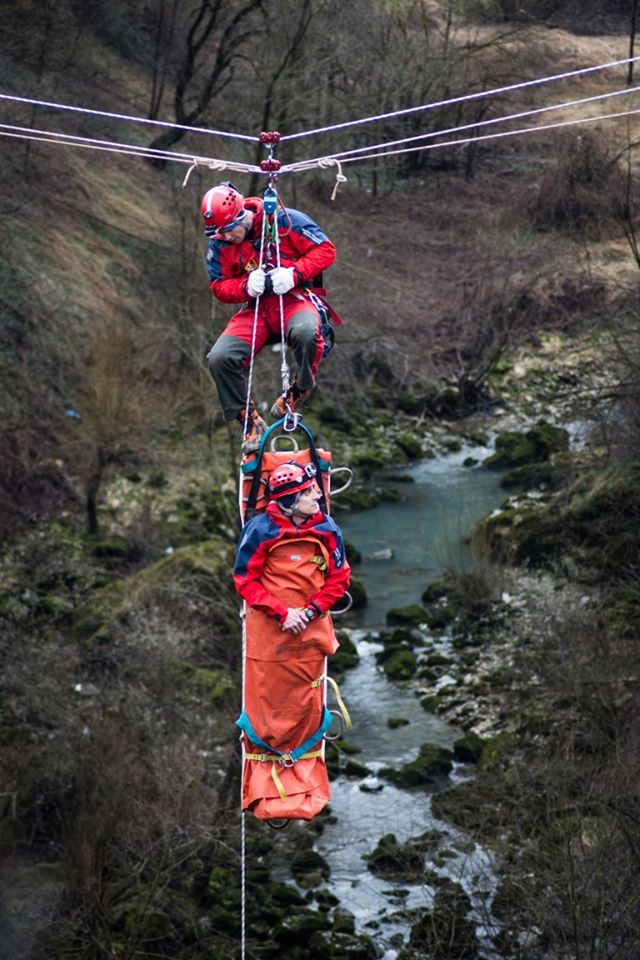
Ascending from a valley floor or descending from a mountain peak with a stretcher is a technically difficult operation, often hindered by darkness and adverse weather conditions. It requires a lot of training and a lot of muscle © HGSS The Croatian Mountain Rescue Service
In the evening, just two days later, we were called out to rescue an Italian guy who broke his leg on Anića Kuk. It's a really mighty part of the stone. And the leader of the expedition asked me to go on the stretcher. They pull you down on the ropes and you have to push very hard to keep the stretcher, the person you're carrying and yourself away from the rock, while balancing the weight of all three. It was dark, raining and with lots of Bura, the incredibly strong wind that sometimes hits us. That's probably my most memorable rescue.
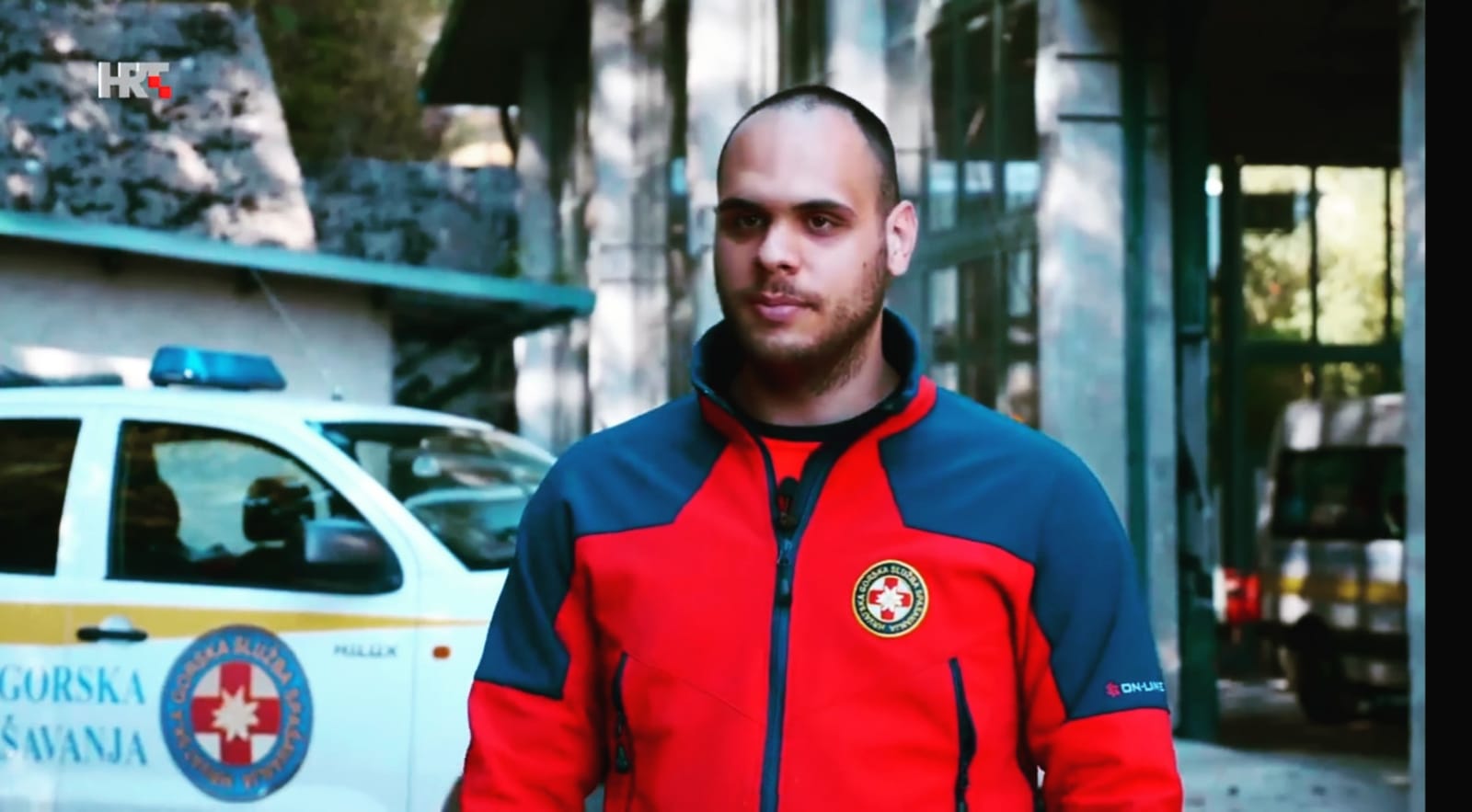
Petar Prpić, firefighter and volunteer for HGSS The Croatian Mountain Rescue Service
My name is Petar Prpić, I'm 25 years old and I'm from Hrvatska Kostajnica, just on the Croatian-Bosnian border. My station is in Novska. In my full-time job I'm a professional firefighter. I guess I have two dangerous jobs. Well, one job and one hobby.
I've always been interested in the outdoors – mountaineering, hiking, canoeing. But, that's not why I joined HGSS The Croatian Mountain Rescue Service. I just wanted to help people. I don't know, I guess it's just something in me.
We have a lot of rivers in our area. During the times of flood, we get a lot of call-outs. Our part of the country has a high percentage of elderly people in the population. A lot of them live in small villages, on the edge of the forest. We get a lot of call-outs for searches. Especially in the autumn when people go out looking for chestnuts or mushrooms. But, like all the stations in Croatia, we are here year-round if there are any actions in other parts of the country that need us.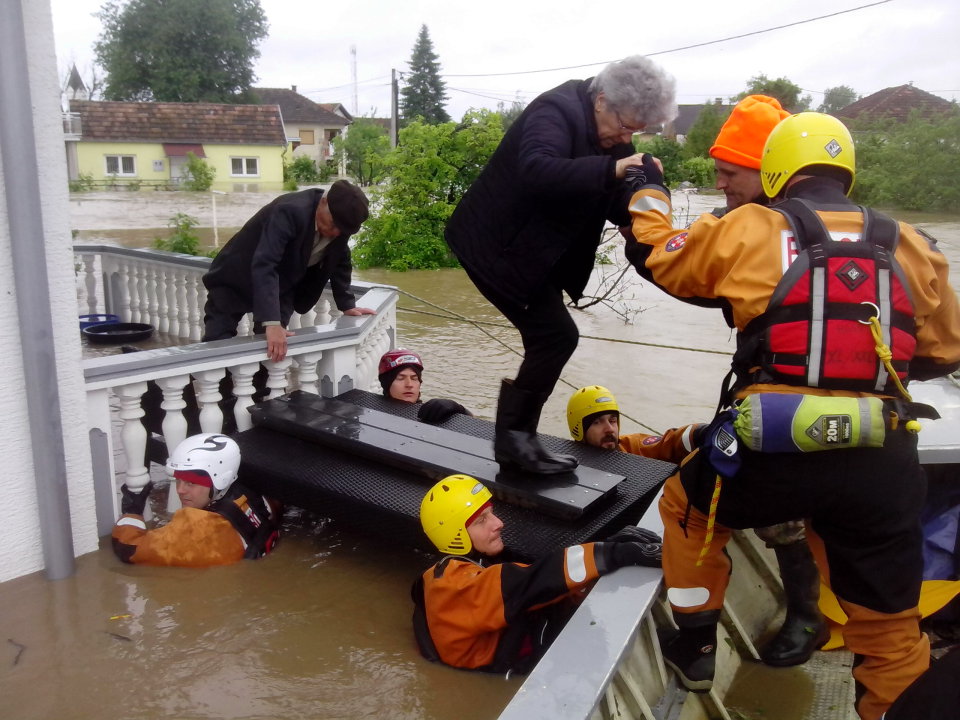
In some areas, HGSS The Croatian Mountain Rescue Service are frequently called out in response to flooding. This picture shows HGSS members on operation during the 2014 floods. In that year, flooding across the whole region was so bad that HGSS members operated not only in Croatia, but also donated their services to neighbouring Bosnia and Serbia © HGSS The Croatian Mountain Rescue Service
I was just on the search in Biokovo. The head of service called me and asked me to go. I first had to get some free days from my job. I called my boss, Zvonimir Ljubičić, chief of the fire department. He's great, very understanding, and he gave me permission. Two years ago I was called to Rab. Very hard operation, very difficult terrain.
Late last summer, we were called out to look for an older man near Glina. It was around 11 o'clock in the evening. He'd gone to look for mushrooms in the afternoon and never came back. Police were there and they sent for us.
The man had a cell phone on him, but there was no signal. There was no location given off the phone. We were a team of four, split into two teams. We went up into the woods above Glina and concentrated our search on areas where we could see there was no telephone signal on our phones. We were yelling in the dark. After an hour of search, someone answered. He'd been missing since 2pm. We found him at 2am. He was just lying there, uninjured but unwell, unable to move.
The reason it sticks in my mind is that the next day, in the morning, his daughter called me. She was so thankful, so emotional. For sure we saved his life. None of the other emergency services who were present could find him. It was down to us. We finished the operation at about 6am and then all four of us had to go immediately to our regular jobs.
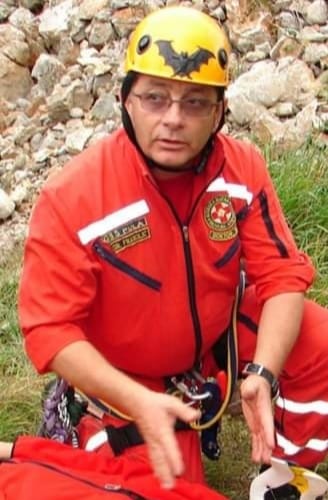
Mario Franolić, physician, ex-commando and volunteer for HGSS The Croatian Mountain Rescue Service
My name is Mario Franolić and I'm 60 years old. I'm the chief of the mountain rescue service in Istria. I travel throughout Croatia because I'm also an instructor for the medical commission of HGSS. I was born on island Krk. I'm based in Pula although I work in Rijeka. I travel a lot between the two. I've been with HGSS The Croatian Mountain Rescue Service for 18 years.
In my day job, I'm a physician. I am a senior mentor at the Institute for Underwater and Hyperbaric Medecine in the Clinical Hospital Rijeka. I'm an expert in my field of emergency medecine. I've been doing it for almost 30 years.
When I was young, I trained to be a physician in Belgrade. It was then the best medical faculty in Yugoslavia. At the same time, I also started spelunking (cave exploration). I've been doing it since 1978. Later, I was a physician in the military underwater commando unit. I lived in Austria for five years, but when I came to Pula, they were just starting the HGSS The Croatian Mountain Rescue Service station here. They asked me for help because they didn't have any medical professional on the team. I accepted. It would be a waste not to use all these skills I have.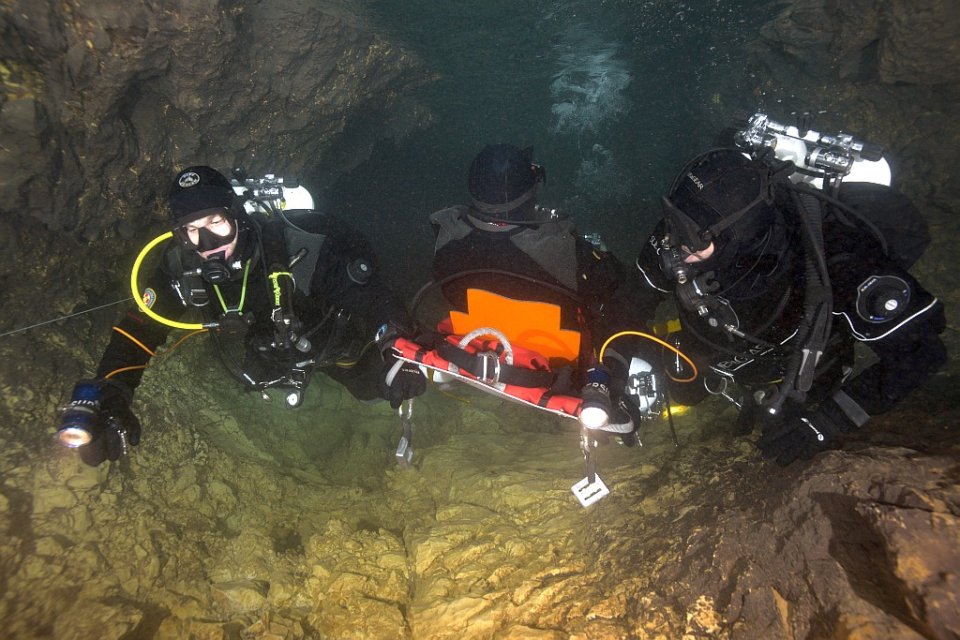
Specialist teams from HGSS are trained in underwater rescue from caves. Such caves exist all over Croatia in the karst rock, and also on some islands © HGSS The Croatian Mountain Rescue Service
Sometimes, our status as volunteers can give us problems. Although we have official duties, we are more like an NGO than something like the police. There can be legal implications. I remember one situation, very acute because a paraglider fell from the sky. None of his colleagues saw him fall. Paragliders go into the air together, but then they each branch off to do their own thing.
We had no idea about the location. We started from the last point of sighting, knowing that it could be very far from the place where he actually fell. But, we had to start somewhere. We had one mobile phone signal direction. But, you need three in order to locate someone. We only had a line on the map.
In the past, HGSS The Croatian Mountain Rescue Service sometimes had difficulties because the telephone companies wouldn't give us the information we needed in order to triangulate the position of a missing person. They would only give it to the police. But, it's a race against time. We searched for this man all day and all night. In the morning, some Croatian paragliders made private contact with a guy from the phone company. They begged him to release the information we needed. Although he could lose his job, giving such information to private citizens, he did it.
We found the man about 150 metres from where we were. Sadly, he was already dead. It was very small comfort to see that he had died instantly, on impact. It's unbearable when you reach someone you could have saved if only you had got there quicker, especially in an instance such as this, where we were hindered by a lack of information that was available. I think it moves more quickly now, but still we have to go through the police.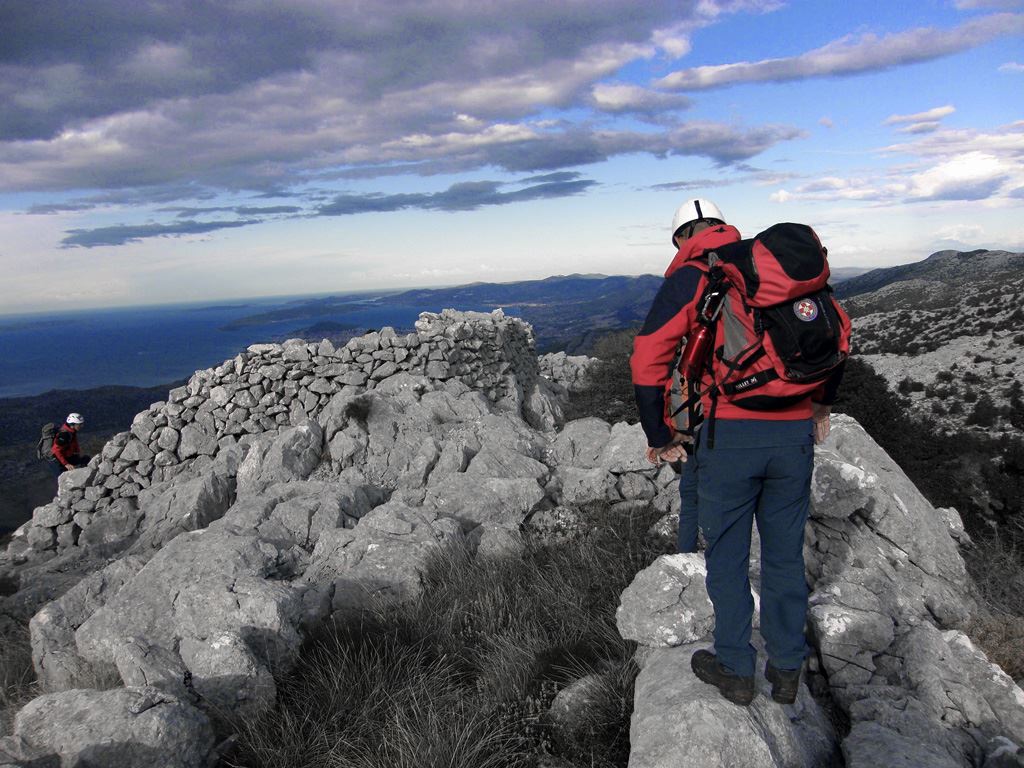
© HGSS The Croatian Mountain Rescue Service
One of the most emotional operations I went on was around five years ago, the rescue of a young girl - maybe two and a half to three years old – who got lost in the woods in a small place in central Istria. She chased into the forest after some dogs around 10 or 11 in the morning. The family saw immediately that she had disappeared and started to search. About two hours later, we were called out. It was impossible for the family to find her.
About 300 people came – my station, the Rijeka station, hunters, firemen, police and volunteers. In such an operation, the police are the lead service. But, 99% of the time they leave the organisation of the search to HGSS The Croatian Mountain Rescue Service. We are the only organisation who is very well educated in organising searches. When other people do searches, they use intuition. But, people all have different intuition. It can be chaotic. We are highly trained for this. There are procedures, recognised internationally, that we follow. We found her early in the morning, at around 7 o'clock. The dogs were lying on each side of her, giving her warmth.
All photos courtesy volunteers and HGSS The Croatian Mountain Rescue Service
New Snow-Making Machine Tested on Platak
ZAGREB, January 13, 2020 - A new snow-making machine has successfully been tested over the past week at the Mount Platak sports and recreation centre and skiing is now possible on part of the run while investments at the centre are continuing, a press conference was told by Primorje-Gorski Kotar County authorities on Monday.
Deputy County Prefect Marko Boras Mandić said that tests of the new system had successfully been conducted over the past week, which means that even though there is no natural snow, skiing has been made possible on part of the ski run.
"So far we have successfully covered 80% of the Radeševo ski run and if these low temperatures continue, in a day or two the entire run will be ready for the first skiers," he said and added that water from a nearby reservoir is being used to make the snow.
Ljudevit Krpan of the regional office for development, infrastructure and project management announced that investments in the Mount Platak centre would continue.
"This year, the county road management administration will continue road reconstruction on Mount Platak valued at 2.8 million kuna and a further 15 million kuna from the county budget is planned for the construction of a four-seater ski lift," Krpan said and added that the county was considering the possibility of introducing summer-time activities and that it would apply for EU funds for those projects.
More news about skiing in Croatia can be found in the Lifestyle section.
CRO Race: Adam Yates Takes Fifth Stage from Rabac to Platak
October 6, 2019 - British cyclist Adam Yates, a member of the Australian Mitchelton-Scott team, won the fifth stage of the CRO Race from Rabac to the 136-kilometer ascent to the top of Platak, and has also taken the overall lead.
HRT reports that Yates hit the finish line at 3:40:01, which was 10 seconds ahead of his closest companions, second-placed Italian David Villella (Astana) and third-placed Spaniard Victor De la Parte (CCC).
Before the final, sixth stage, which will run from Sveta Nedelja to St. Mark's Square in Zagreb (155km), Yates is 15 seconds faster than Villella in second, and 17 seconds ahead of De la Parte in third.
“This was a stage that suited me; the team drove it well and prepared the ground for me to win. This is my first time performing in Croatia, and I am very pleased, the roads are excellent, the organization is top-notch and I hope to celebrate the overall victory tomorrow,” said Yates.
With this triumph, Yates took the overall lead and the green t-shirt for the best climber, while the blue t-shirt for the best sprinter was kept by teammate Australian Alexander Edmondson (Mitchelton-Scott). The best young cyclist and the white shirt was awarded to Kazakhstani cyclist Vadim Pronski (Astana).
Croatian veteran, 40-year-old Radoslav Rogina (Adria Mobil), in the day before the final stage, finished 10th overall, 1:50 minutes behind Yates.
The fifth leg of the CRO Race began in Rabac, close to the Valamar Hotel Complex, and started when riders arrived at the foot of the old town of Labin, where the first target was located. Slovenian champion Domen Novak (Bahrain-Merida) came first, ahead of Australian Benjamin Hill (Ljubljana Gusto Santic) and Dutchman Lars van den Berg (Metec-TKH).
After about 20 kilometers, a group of 11 drivers stood out from the peloton, none of whom were dangerous in the overall order. However, at no point did the 11-man lead manage to gain an advantage of more than three minutes, and their escape was already completed at the beginning of the climb to Ucka, 70 kilometers before the finish.
The flight for the overall victory had already started in Ucka, and in the second half of the 10km climb were favorites Briton Adam Yates (Mitchelton-Scott), Italian David Villella (Astana), Spaniard Victor De la Parte ( CCC), Frenchman Alexis Guerin (Delco Marseille), Australian Nathan Earle (Israel Cycling Academy) and Slovene Domen Novak (Bahrain-Merida). Still, De la Parte's teammate Riccardo Zoidl (CCC) moved to the front at Ucka Nature Park, ahead of Slovene Domen Novak (Bahrain-Merida) and Australian Callum Scott (Mitchelton-Scott).
However, during the descent from Ucka and on the way to Opatija, the favorites slowed their pace and allowed several riders to return to the leading group. A small lull in the fight for the overall win was used by Spanish veteran Ruben Plaza (Israel Cycling Academy), who pushed to first in Opatija ahead of Kazakhstani Vadim Pronsky (Astana) and Frenchman Alexis Guerin (Delco Marseille). By the next target in Rijeka, a group of three cyclists was formed, and the first to hit Korzo was Slovenian Grega Bole (Bahrain-Merida).
The sprinter Bole soon led the group, and Pacher and Plaza managed to take the road toward Platak with about half a minute ahead of the peloton. Neither of them remained in the lead for long, and immediately after Plaza was swarmed by the main group, his Swiss teammate Matteo Badilatti attacked.
Badilatti's adventure lasted only until five kilometers before the finish line when the favorite for the overall victory, Adam Yates, decided to justify his status as the lead. Yates attacked forcefully and in just 200 meters, produced a 20-second advantage over his closest competitors. The hunt for Yates started by Novak, but in the last kilometer, he relented, and Villella, De la Parte and Rolland caught up.
The sixth, final stage (154 km) ends on Sunday in Zagreb. This year, Sveta Nedelja was chosen as the start, after which cyclists will head to Zagreb, Velika Gorica, Dugo Selo, Vrbovec and Sveti Ivan Zelina, and return to Zagreb through the eastern part of Zagreb County to finish at St. Mark's Square.
RESULTS
1. Adam Yates (VB/MTS) 3:40:01
2. Davide Villella (ITA/AST) +10 sec
3. Victor de la Parte Gonzalez (ŠPA/CCC)
4. Pierre Rolland (VCB/FRA)
5. Domen Novak (SLO/TBM) +11
6. Nathan Earle (AUS/ICA) +17
OVERALL
1. Adam Yates (VB/MTS)
2. Davide Villella (ITA/AST) +15 sec
3. Victor de la Parte Gonzalez (ŠPA/CCC) +17
To read more about sport in Croatia, follow TCN’s dedicated page.
Works on Platak near Rijeka Going at Full Speed, Hoping to Prolong Season
We've previously written about the plans which involve the undertaking of a large reconstruction project on the infrastructure of Platak, a very unique place in Croatia.
Platak is a ski resort, located around 40 kilometers to the north from Rijeka, where you can ski during the winter while having an amazing view of Kvarner bay in front of you. It's a popular winter destination for the people of Rijeka and the surrounding area, and has been gaining popularity even during the summer months, since the ever-increasing temperatures at the location with the lower elevation have been forcing people to find refreshment at higher altitudes.
The works we wrote about in the previous article have started on time, and the first phase is almost finished - it is expected to be fully done by the end of this year.
The entirety of the project should be fully completed by the end of 2020. One of the most important parts of this entire project is the installation of the snowmaking system at Platak, which will improve the reliability of the naturally unreliable snow cover at Platak. It will also help extend the ski season, and Primorje-Gorski Kotar County Prefect Zlatko Komadina, while visiting, said that he hoped it would achieve as many as 40 to 50 skiing days on Platak.
To get that done, a whole new lake will have to be built (where the water will be kept for the snow guns), and it will become a new attraction at the site, with a walkway around it. A new cableway is also going to be built, with the idea of connecting Platak with the Risnjak National Park. The road to Platak is also undergoing reconstruction, Novi List writes.
Infrastructure for various other sports is also being improved at Platak, with hopes that it will attract many athletes for their training at higher elevations. As a part of that, a partnership has been concluded with Rogla, a well-known winter sports centre in Slovenia.
The summer program on Platak has already begun, and many events are already taking place at the centre. On September the 8th, the last day of summer, a festival will be held there.


